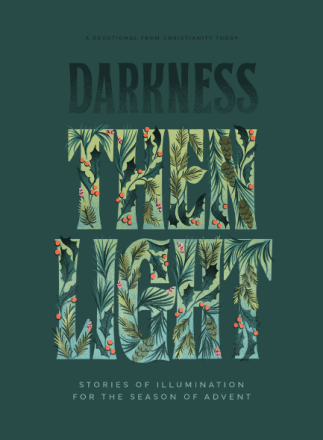The darkness haunts me. During the successive weeks of Advent, I want the mood to lift, the light to shine, and the joy to radiate. Yet the illuminated tree, songs of good tidings and cheer, sweet cookies, and all the trimmings of “the most wonderful time of the year” can’t overcome the foreboding darkness that looms just on the other side of December 25.
As I meander further into my middle-aged years, the fear of greater hardship and affliction grows. December 25 gives way not to bliss and joy but to the literal darkness of January. Short daylight hours, bone-chilling cold, and the slog of a new year of work bring me into a depressive state. Another page of the calendar turns, and my concerns multiply. Will this be the year everything goes so poorly that I’m ruined? Will the world break apart in an all-out war? Will I be so short-sighted and uncaring that I make an irredeemable mess? Is this the year the other shoe drops and grief shrouds my eyes from any joy?
Left to my own ruminations, the darkness wins. Every time. My perspective is too narrow and jaded to gain a glimpse over the horizon. The darkness is too pervasive to think a dawning light could drive the shadows away. Hope is for those who are already winners.
That is, of course, if you ignore God’s promise. The promise.
The promise isn’t for the winners. It’s not for the whole and healthy or the rich and powerful. The promise is for those who live in the land of deep darkness. “On them has light shone” (Isa. 9:2, ESV, emphasis mine). Embracing that promise takes a mountain, or only a mustard seed, of humility. I live in that dark land. I am both a creation and a creator of it. Yet if I admit that the darkness dwells within me, I am poised to be on the receiving end of the promise.
The light has shone. Jesus confronts our present darkness with his piercing light: “While I am in the world, I am the light of the world” (John 9:5). He comforts fearful and cowering dwellers of the darkness, saying, “Do not let your hearts be troubled. You believe in God; believe also in me” (14:1). He delivers us from the dominion of darkness, bringing us into his kingdom through the shedding of his own blood (Col. 1:13).
The light will shine. The present darkness does not stand a chance with the coming Second Advent. Jesus is “the radiance of God’s glory” (Heb. 1:3). When he comes again, he will put all things to rights. His light of grace and justice will fully illuminate even the secret things. It’s by his glorious light that the nations will walk. Darkness will not overcome, “for the Lord God will give them light. And they will reign for ever and ever” (Rev. 22:5).
Yes, darkness is present. The darkness may get deeper still. But the promise is dawning. Post tenebras lux. “After darkness, light.”
Jeremy Writebol is the lead campus pastor of Woodside Bible Church in Plymouth, Michigan, and the executive director of Gospel-Centered Discipleship. He is the author of several books including Make It Your Ambition, the award-winning Pastor, Jesus Is Enough, and everPresent: How the Gospel Relocates Us in the Present.













